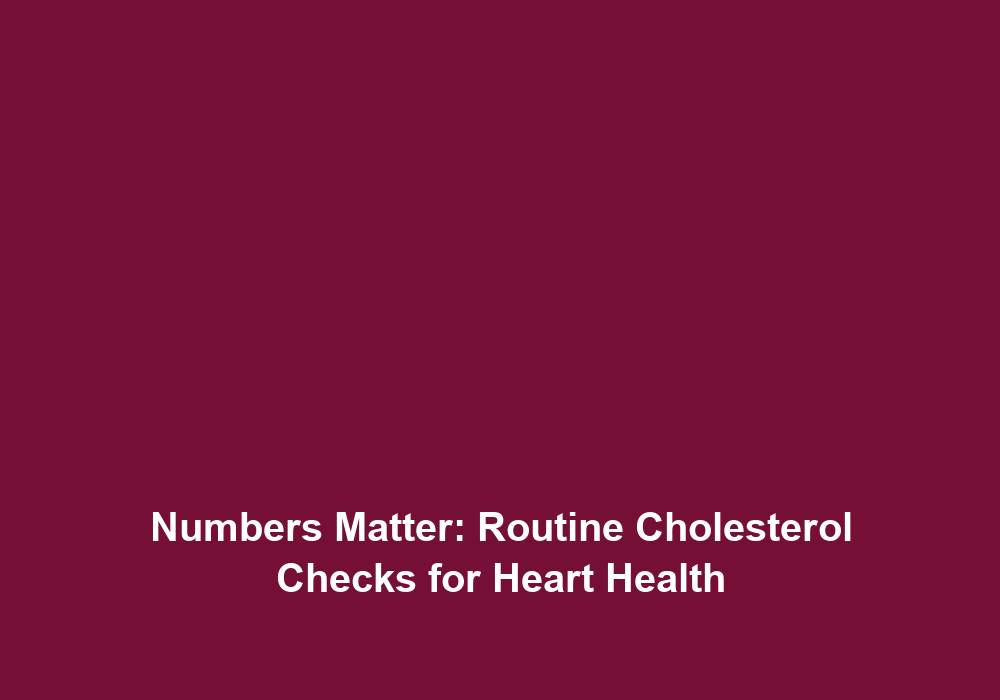Numbers Matter: Routine Cholesterol Checks for Heart Health
Cholesterol, a waxy substance found in the fats (lipids) in our blood, is essential for building healthy cells in our body. However, high levels of cholesterol can pose a risk to heart health by contributing to the development of fatty deposits in blood vessels. Routine cholesterol checks are crucial in monitoring and maintaining heart health. In this article, we will delve into the significance of cholesterol checks, the ideal frequency for testing, and the key numbers you need to pay attention to.
Why are Routine Cholesterol Checks Important?
Regular cholesterol checks hold significant importance for several reasons. Let’s explore some key reasons why you should prioritize these tests for your heart health:
-
Detecting and Preventing Heart Disease: Elevated levels of cholesterol, particularly LDL (low-density lipoprotein) cholesterol, can lead to the formation of fatty deposits in blood vessels. These deposits can eventually cause heart disease and increase the risk of heart attacks and strokes. Routine cholesterol checks play a vital role in identifying high cholesterol levels early on, allowing for timely interventions and preventive measures.
-
Evaluating the Effectiveness of Lifestyle Changes: Lifestyle modifications, such as adopting a healthier diet and increasing physical activity, can have a positive impact on cholesterol levels. Regular cholesterol checks enable you to assess whether your lifestyle changes are effectively lowering your cholesterol levels and reducing the risk of heart disease. By monitoring the progress of your cholesterol levels, you can make informed decisions about continuing or adjusting your lifestyle habits.
-
Monitoring the Efficacy of Medications: For individuals who require cholesterol-lowering medications, routine cholesterol checks are crucial to monitor the effectiveness of the prescribed drugs. These tests provide valuable insights into whether the medications are successfully managing cholesterol levels and reducing the risk of heart-related complications. By closely monitoring your cholesterol levels, healthcare professionals can make necessary adjustments to your medication regimen to ensure optimal heart health.
How Often Should You Get Your Cholesterol Checked?
The frequency of cholesterol checks varies depending on factors such as age, medical history, and overall cardiovascular health. Here are some general guidelines:
-
Adults: In general, adults should have a cholesterol check at least once every five years. However, if you have already been diagnosed with high cholesterol, have a family history of heart disease, or have other risk factors, your healthcare provider may recommend more frequent testing. It’s important to consult your healthcare professional to determine the most appropriate testing schedule for you. They will consider your individual risk factors and provide personalized recommendations to ensure optimal heart health.
-
Children and Adolescents: Children and adolescents should also have their cholesterol levels checked if they have a family history of early-onset heart disease or if they have other risk factors such as obesity or diabetes. The American Academy of Pediatrics recommends that all children between the ages of 9 and 11 years, and again between 17 and 21 years, undergo cholesterol screening. Early detection and intervention can help prevent the development of heart-related complications in the future.
Understanding Cholesterol Numbers
When you receive your cholesterol test results, they will typically include several numbers. Understanding these numbers is crucial in assessing your heart health. Let’s explore the key cholesterol numbers and what they mean:
-
Total Cholesterol: This number represents the sum of your HDL (high-density lipoprotein) cholesterol, LDL cholesterol, and a fraction of your triglycerides. The desirable total cholesterol level is below 200 milligrams per deciliter (mg/dL). Maintaining an optimal total cholesterol level is important for reducing the risk of heart disease and maintaining overall heart health.
-
LDL Cholesterol: Often referred to as “bad” cholesterol, LDL cholesterol is responsible for the buildup of plaque in your arteries. Lower levels of LDL cholesterol are associated with a reduced risk of heart disease. The optimal LDL cholesterol level varies depending on your risk factors. In general, an LDL cholesterol level below 100 mg/dL is considered optimal, while levels between 100 and 129 mg/dL are considered near or above optimal. It is important to work with your healthcare provider to determine the target LDL cholesterol level that is appropriate for your specific risk factors.
-
HDL Cholesterol: HDL cholesterol, also known as “good” cholesterol, helps remove LDL cholesterol from your bloodstream, thus reducing the risk of plaque buildup. Higher levels of HDL cholesterol are desirable, as they indicate a lower risk of heart disease. For men, an HDL cholesterol level of 40 mg/dL or above is considered optimal. In women, an HDL cholesterol level of 50 mg/dL or above is generally considered optimal. By maintaining healthy HDL cholesterol levels, you can support your heart health and reduce the risk of heart disease.
-
Triglycerides: Triglycerides are another type of fat found in the blood. Elevated triglyceride levels are often associated with a higher risk of heart disease. A desirable triglyceride level is less than 150 mg/dL. By managing your triglyceride levels through lifestyle modifications and, if necessary, medication, you can reduce the risk of heart-related complications and promote overall heart health.
Tips for Maintaining Healthy Cholesterol Levels
Maintaining healthy cholesterol levels is crucial for heart health. Here are some tips to help you achieve and maintain optimal cholesterol levels:
-
Follow a Heart-Healthy Diet: Incorporate a diet rich in fruits, vegetables, whole grains, lean proteins, and healthy fats. These foods provide essential nutrients and help support heart health. Limit the intake of saturated fats and trans fats found in fried and processed foods, as they can increase LDL cholesterol levels. Opt for healthier cooking methods such as baking, grilling, or steaming to minimize the use of unhealthy fats.
-
Engage in Regular Physical Activity: Regular exercise can help raise HDL cholesterol levels and lower LDL cholesterol levels. Aim for at least 150 minutes of moderate-intensity aerobic activity or 75 minutes of vigorous-intensity aerobic activity per week. Physical activity not only improves cholesterol levels but also supports overall cardiovascular health and boosts your well-being.
-
Maintain a Healthy Weight: Losing excess weight can positively impact cholesterol levels. Excess weight, especially around the waistline, is often associated with higher LDL cholesterol levels and lower HDL cholesterol levels. Consult with a healthcare professional to determine a healthy weight range for you and develop a personalized weight loss plan if necessary. By achieving and maintaining a healthy weight, you can significantly reduce the risk of heart disease and improve your overall heart health.
-
Quit Smoking: Smoking lowers HDL cholesterol levels and damages the lining of your blood vessels, making them more susceptible to cholesterol buildup. Quitting smoking can help improve your cholesterol profile and reduce the risk of heart disease. Seek support from healthcare professionals and explore smoking cessation programs to successfully quit smoking and protect your heart health.
Conclusion
Regular cholesterol checks are essential for maintaining heart health and preventing heart disease. By monitoring cholesterol levels and understanding your numbers, you can make informed decisions about lifestyle changes, medications, and preventive measures. Remember, numbers matter when it comes to cholesterol, so prioritize routine cholesterol checks and take proactive steps towards a healthier heart. By adopting a heart-healthy lifestyle and working closely with your healthcare provider, you can maintain optimal cholesterol levels and safeguard your heart health for years to come.







